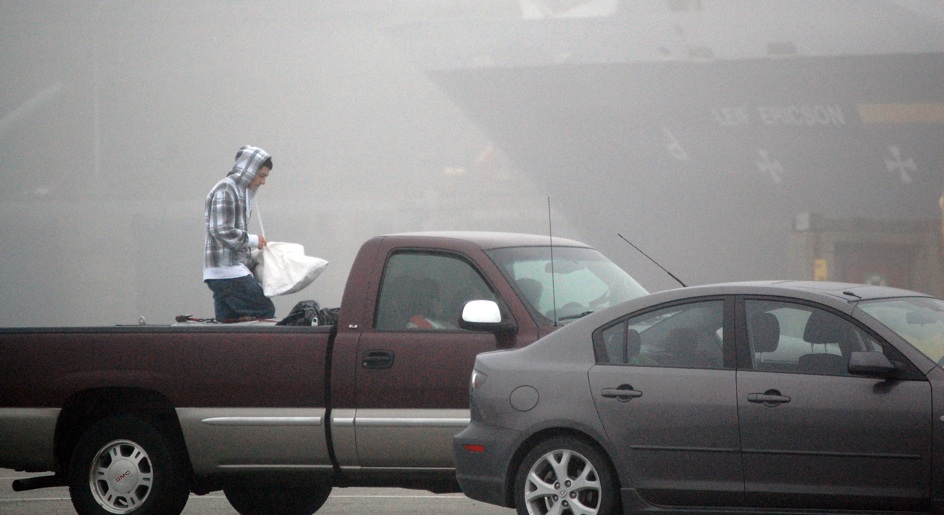
Hundreds of cars wait to board a Newfoundland ferry at 3 in the morning. The Marine Atlantic vessel, scheduled to depart at midnight, did not begin boarding until 5 am. Image by Steven Dale.
Never ignore the local, vernacular knowledge of a foreign land.
When you plan or decide for someone else, it’s your obligation to listen to what the locals know. When you don’t, things can go terribly wrong.
For example:
The Marine Atlantic ferry system linking the island of Newfoundland to Canada’s mainland is a disaster as any Newfoundlander will tell you.
Ferry delays and cancellations are more common than not, especially during winter. As the ferry system is Newfoundland’s primary link to the mainland, delays and cancellations cause hardship for truckers and residents alike.
Last summer my partner and I experienced this first hand: One 6 hour delay into Newfoundland (for a midnight crossing) and on the return leg our ferry was cancelled due to a mechanical fire.
In order to catch the next available ferry, we had to drive 1,000 km in 18 hours. That ferry was the lone vessel servicing the entire island population and we were told by Marine Atlantic there was no guarantee of a space on-board.
(We caught the ferry, incidentally, because it was 5 hours late to depart. It dropped us off at North Sydney at the inconvenient time of 3:30 am, at which point most hotels and inns were fully booked. We slept in our rental car in a picnic area.)
“Yeah, it’s tough for you tourists,” a computer repairman explained while I recharged my cell phone in his shop. “But remember, for you guys it’s a hassle. For us, we run out of food.
“Meanwhile,” he continued, “our only real airports (Gander and St. John’s), they build in the foggiest parts of the island. Smart, huh?”

A young man prepares for a nap in the flatbed of his truck to pass the time waiting for a much-delayed ferry crossing in Port Aux Basques, Newfoundland. Image by Steven Dale.
After hearing that, I paid particular attention to grocery and convenience store shelves. They were noticeably bare, particularly in the small town convenience stores which rural Newfoundlanders rely upon for daily groceries.
I asked around as to why this happened so frequently and, as Newfoundlanders are wonderfully outgoing and proud of their conversation skills, I found no shortage of people willing to tell me.
Some blamed Newfoundland’s status as “the runt” of the Canadian litter, other’s blamed operational negligence, but one waitress in Port Aux Basques explained the problem best:
One of the major issues are the ferries used by Marine Atlantic. The newest of them – the Vision – was leased from a German consortium that builds ships for the North Sea. The problem, our waitress explained, stems from the ships being too tall to handle the 100-plus km hour winds Newfoundland experiences.
One ship, according to the waitress, was grabbed by the wind, pushed off-course and nearly slammed into the village itself.
It seems that the land-faring selection committee thought they understood Newfoundland’s waters better than a few generations of fishermen.
The fishermen in the town continually warned the ferry selection committee not to select this vessel, but to no avail. The selection committee went ahead with the decision anyways. A Marine Atlantic employee, unwilling to give her name, confirmed the waitress’s story and said several members of the selection committee had since “moved on.”
“Those ships,” our waitress said “ain’t made for these waters.”
The town, the locals and the fisherman repeatedly informed the committee of their concerns, but the concerns fell on deaf ears. Now look where they are: Worthless ships, constant delays, food shortages and losses-upon-losses due to refunds issued to disgruntled passengers and truckers.
Advisers, consultants and selection committees sometime make the mistake of assuming that because they, themselves are being consulted for advice they need not consult others for advice of their own. The Marine Atlantic debacle is just such an instance.
Sometimes the advice we need comes from unlikely places. But other times, it comes from an obvious source. It’s not hard, after all, to understand that to learn what kinds of boats work in what kinds of waters, you have to ask a fisherman.
In either case, it should be our duty and pleasure to listen.


2 Comments